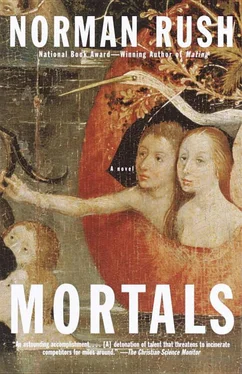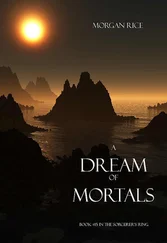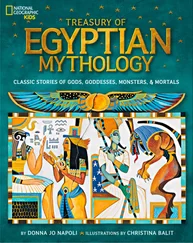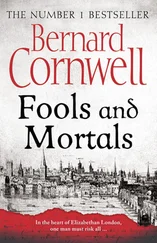“I liked Milton and you were certain I wouldn’t.”
“Well, I was selective. Also I don’t think you liked Milton a lot, did you?”
“I did. I loved Areopagitica .”
“That isn’t poetry, of course.”
“It’s Milton.”
“Okay! I’ll get Tennyson for you, I will, I will.”
“If I wasn’t up to Milton, I wonder if there was anybody around qualified to remedy that pathetic situation.”
“You mean I should have been your tutor.”
“Who better?”
“I don’t know. Maybe you’re right. We could try again, I guess.”
“Please don’t overwhelm me with your enthusiasm.”
He didn’t want to get into the vexed question of her literary education and what, exactly, his responsibilities in this area were. The ideal observer would say that since he taught Milton at work, he had a right not to have to teach it again when he got home. Or was it that, in not bringing Milton to Iris, he was trying to protect himself from a declaration from Iris that Milton was … less than she expected?
Also, he didn’t like the way one thing led to another when the subject came up of what she should be reading. For example, since he claimed to love the novel, why didn’t he read more of them, and why, when he did read them, did it seem he read so few novels by women? Did his interest end with Jane Austen? The problem was that they had a fundamental difference over reading, revolving around the proposition, her proposition, implicit, that whatever you read should be discussed and dissected with your mate, which created a certain pressure to read works of a certain caliber and to read with a certain mindfulness you might be in the mood to escape from. Right now he didn’t want to think about it.
The gravamen, roughly, of the poem Kerekang had recited was that those who strove for the coming of universal justice should never be downhearted, because, as Ray was reconstructing the sentiment, in the act of virtuous struggle you are somehow partaking of the Golden Year even though it hasn’t temporally arrived yet. He would have to listen to it again, or read it, but that was about right. It sounded lame in summary, yet it had been thrilling, especially during Kerekang’s complete, heroic embrace of the Welsh accent in which the heroic member of the hiking group expressed his defiant positiveness about the future. Sections of the poem were still with him.
When wealth no more shall rest in mounded heaps ,
But smit with freer light shall slowly melt
In many streams to fatten lower lands ,
And light shall spread ,
and man be liker man
Thro’ all the season of the golden year …
And then the windup, in the voice of the old, indomitable do-gooding Welshman in rebuttal to the pessimism of the younger men in the party about the possibility, ever, of justice, general justice, being achieved.
What stuff is this!
Old writers push’d the happy season back ,
The more fools they, we forward: dreamers both …
Then something he’d lost, then something ending with
That unto him who works, and feels he works ,
This same grand year is ever at the doors …
Ah yes, and just before that, Leonard, the old man, has broken his walking staff in fury at the younger man’s pessimism … and then came the conclusion to the whole thing with that blast in the slate quarry, for emphasis, how great! … Now tell me literature is dead … Look around! … The true voice of feeling, exhilarating! … Okay it was Victorian, but in the best way … Splendid man, and I rest my case, and Boyle must have seen it, he had to see it, how could he not see it? Victorian, but fine stuff … the best kind of Victorian, here by time machine … You’re a better man than I am, Kerekang … So bravo, that’s all.
And then, crowning the already perfect climax, Kerekang had turned to his tatterdemalions and, like a maestro, summoned from them a great shout of, of what, of defiance, the shout standing for the quarry blast, Ray supposed. The poem had described it and the children had embodied it. And the shout had expressed farewell, too, as the children had raised their right arms in a mass salute aimed at Wemberg, the fascist salute actually, although that was obviously a completely accidental resemblance not affecting the impact of the thing. He thought, Anyway the fact is that there are a limited number of physical gestures available for the expression of the emotion of solidarity, which is why dance, thanks to the limitations of the silent, lumbering body as a means of articulating anything, constitutes the lowest rung on the ladder of art, in his humble opinion, dance with its grabbing motions to signify desire and its pushing motions to signify aversion and its grabbing then pushing then grabbing again to show ambivalence, for crying out loud. Iris missed the ballet. He didn’t. The cry of the children had been the perfect opposite of the pinched, supplicating noise of the Anglican girls’ choir.
And then there had come the terrible, perfect conclusion, the answering cry of sorrow and ruin their act had torn from Wemberg, at the end.
Iris was gone. She had been affected too. He shouldn’t have been annoyed with her over Milton. He was too selfish. If God were a reader he would have brought the shade of Tennyson back for this moment. But it was time to find Iris.
He hesitated. He would find Iris shortly. But he wanted to say something personal to Wemberg, not that he had any particular history with him, but the impulse was there. What he wanted to say came down to something like We’re all dying, don’t worry , an impossibility, but something. It wasn’t just a cliché about universal mortality he wanted to impart. What he wanted to do was acknowledge that something he feared himself, dying in Africa and leaving a mate to figure everything out, had somehow cruelly happened to this unfortunate man, in spades. It was the fear of being left alone in Africa, where nobody loved you. Iris was afraid of it too. And she was going to leave him in Africa so she could visit her sister, not the same thing but it had a certain relationship to the real thing. She was definitely going. She had her ticket. He was divided. He also wanted to say something to Kerekang, pat those children, register something, which was not a good idea because he knew better than to give Boyle any opening to think of him as aligned with Kerekang. The crowd bulged toward the buffet.
Wemberg seemed to be gone. Ray couldn’t find him.
More late arrivers were appearing. It appeared that the embassy had lost control of the gate long enough for this to happen. The strong cooking smells that had afflicted the end of the ceremony had come from frantic lastminute deep-fat frying of extra samoosas, as he had conjectured.
Someone had compiled a tape loop of various largo movements from the classical symphonic repertoire. Between repeats of the loop the Moldau played. The sound coming through the public-address system was too loud, but no one was paying attention. It was the kind of thing Iris would take care of, but where was she?
When he found Iris letting herself out of one of the Portosans set up in the back drive her eyes were red.
This was bad. “What is it?”
“Nothing. Come look at this. Someone urinated on the wall of the Portosan while I was in there, can you believe it? I guess the same guy who tried so hard to get the door open while I was in there. I was terrified. He went around to the back and peed on the Portosan. I heard every drop.”
“That’s disgusting. But that’s not why you’re upset.”
“Nothing is organized here. They should have the toilets gendered, but they just set them up and it’s a free-for-all.”
Читать дальше












